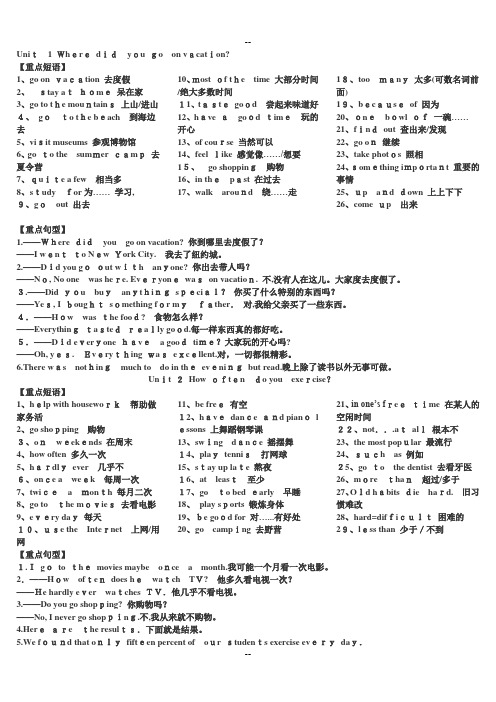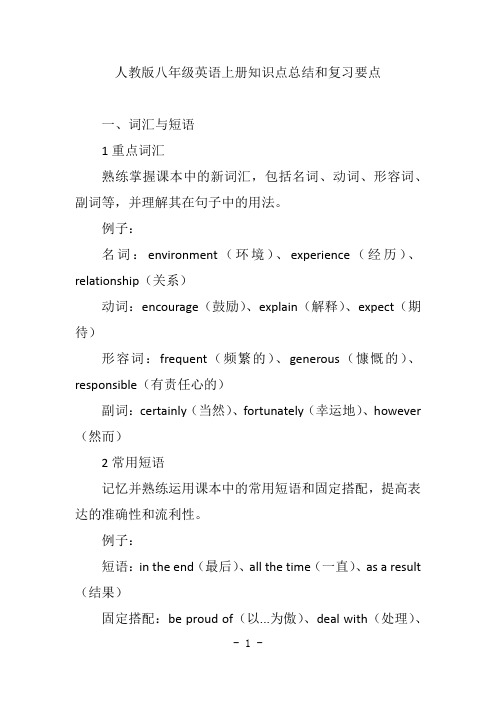新人教版|八年级上学期英语所有必考知识点大汇总
复习人教版八年级英语上册各单元必背知识点整理(打印版)

Unit 1 Wheredidyou go on vacation? 【重点短语】1、go on vacation 去度假2、stay athome呆在家3、go to the mountains上山/进山4、goto the beach到海边去5、visit museums 参观博物馆6、go to the summer camp去夏令营7、quite a few相当多8、studyfor为…… 学习,9、goout 出去10、most of the time 大部分时间/绝大多数时间11、tastegood尝起来味道好12、have agood time玩的开心13、of course 当然可以14、feel like 感觉像……/想要15、go shopping购物16、in thepast 在过去17、walk around绕……走18、toomany太多(可数名词前面)19、becauseof 因为20、onebowl of一碗……21、findout 查出来/发现22、go on继续23、take photos 照相24、something important 重要的事情25、up and down 上上下下26、come up出来【重点句型】1.——Where didyou go on vacation? 你到哪里去度假了?——I wentto New York City.我去了纽约城。
2.——Did you goout with anyone? 你出去带人吗?——No, No one was here. Everyonewason vacation. 不,没有人在这儿。
大家度去度假了。
3.——Did you buyanythingspecial?你买了什么特别的东西吗?——Yes, I boughtsomething for myfather.对,我给父亲买了一些东西。
4.——How was the food?食物怎么样?——Everythingtastedreally good.每一样东西真的都好吃。
人教版八年级上册英语语法、短语和知识点总结归纳

人教版八年级上册英语语法、短语和知识点总结归纳一、语法1. 一般现在时- 用法:表示经常性或惯性的动作或状态。
- 结构:主语 + 动词原形 (+ 其他成分)- 示例:I play soccer every weekend.2. 一般过去时- 用法:表示过去某个时间点或一段时间内发生的动作或存在的状态。
- 结构:主语 + 动词过去式 (+ 其他成分)- 示例:She watched a movie last night.3. 现在进行时- 用法:表示现在正在发生的动作。
- 结构:主语 + am/is/are + 动词-ing (+ 其他成分)- 示例:They are studying for the exam.4. 现在完成时- 用法:表示动作或状态发生在过去某个时间点,但与现在有关。
- 结构:主语 + have/has + 动词过去分词 (+ 其他成分)- 示例:I have finished my homework.5. 情态动词- 用法:表示能力、意愿、可能性等。
- 常见的情态动词有 can, could, may, might, must, should, ought to 等。
- 示例:He should go to bed early.二、短语1. as well as- 用法:表示两个事物同时存在或发生。
- 示例:She can speak English as well as Chinese.2. in order to- 用法:为了做某事。
- 示例:They woke up early in order to catch the train.3. by the way- 用法:用于引入一个新的话题或问题。
- 示例:By the way, have you seen the latest movie?三、知识点1. 直接引语和间接引语- 直接引语:用引号括起来的原话。
- 间接引语:将直接引语转述为陈述句或疑问句。
人教版八年级英语上册知识点总结

人教版八年级英语上册知识点总结一、基本语法1.时态:英语时态分为以下几种:现在时、过去时、将来时。
每种时态又分为简单时态、进行时态、完成时态和完成进行时态等。
例如:–现在时:简单现在时: 主语 + 动词原形;进行现在时:主语 + be(am/is/are) + v-ing;完成现在时:主语 + have / has + 过去分词;完成进行现在时:主语 + have / has + been + v-ing。
–过去时:简单过去时:主语 + 动词过去式;进行过去时:主语 + was / were + v-ing;完成过去时:主语 + had + 过去分词;完成进行过去时:主语 + had + been + v-ing。
–将来时:简单将来时:主语 + will / shall + 动词原形;进行将来时:主语 + will / shall + be + v-ing;完成将来时:主语 + will / shall + have + 过去分词;完成进行将来时:主语 + will / shall + have + been + v-ing。
2.倒装句:倒装是指把谓语动词放在主语前面形成的一种语法现象。
如:Only in this way can we solve the problem. (只有这样才能解决问题。
) 倒装句句型格式为:_____+主语(名词或代词)+_____。
在不同的情况下需要用到不同的“辅助动词/助动词”来进行倒装。
3.被动语态:被动语态就是在句子中表达动作的承受者(即主语)的语态。
结构为:被(或受)动责任的动词(to be) + 过去分词。
如:The book was written by him.(这本书是由他写的。
)4.虚拟语气:虚拟语气是指在表示假设,愿望,建议等语气时所使用的一种语态形式。
其结构为:主语+should/could/might/would+(have)+动词原形。
如: If I were you, I would buy this dress(如果我是你,我会买这件衣服。
人教版八年级英语上册知识点总结和复习要点

人教版八年级英语上册知识点总结和复习要点一、词汇与短语1重点词汇熟练掌握课本中的新词汇,包括名词、动词、形容词、副词等,并理解其在句子中的用法。
例子:名词:environment(环境)、experience(经历)、relationship(关系)动词:encourage(鼓励)、explain(解释)、expect(期待)形容词:frequent(频繁的)、generous(慷慨的)、responsible(有责任心的)副词:certainly(当然)、fortunately(幸运地)、however (然而)2常用短语记忆并熟练运用课本中的常用短语和固定搭配,提高表达的准确性和流利性。
例子:短语:in the end(最后)、all the time(一直)、as a result (结果)固定搭配:be proud of(以...为傲)、deal with(处理)、pay attention to(注意)二、句型与语法1基本句型熟练掌握五种基本句型,包括主语+谓语、主语+谓语+宾语、主语+谓语+间接宾语+直接宾语、主语+谓语+宾语+宾语补足语、主语+系动词+表语。
例子:主语+谓语:She sings.(她唱歌。
)主语+谓语+宾语:I like apples.(我喜欢苹果。
)主语+谓语+间接宾语+直接宾语:He gave me a book.(他给了我一本书。
)主语+谓语+宾语+宾语补足语:I found the book interesting.(我发现这本书很有趣。
)主语+系动词+表语:She is beautiful.(她很漂亮。
)2时态深入学习并掌握现在完成时、过去进行时、一般将来时、过去将来时等时态的用法和形式。
例子:现在完成时:I have already seen that movie.(我已经看过那部电影了。
)过去进行时:They were playing football when I called them.(我打电话给他们时,他们正在踢足球。
最新人教版八年级上册英语知识点总结 成为英语小能手 快速提高听说读写能力

最新人教版八年级上册英语知识点总结成为英语小能手快速提高听说读写能力最新人教版八年级上册英语知识点总结英语是一门世界通用的语言,对于学习者而言,掌握好英语是非常重要的。
本文将为大家总结人教版八年级上册英语的知识点,帮助大家快速提高听说读写能力。
一、语法知识1. 一般现在时(Simple Present Tense):用于描述经常性的动作或客观事实。
例句:I often go to school by bus.2. 一般过去时(Simple Past Tense):用于描述过去发生的动作或状态。
例句:She watched a movie last night.3. 一般将来时(Simple Future Tense):用于表示将来要发生的动作或情况。
例句:I will visit my grandparents next week.4. 现在进行时(Present Continuous Tense):用于表示现在正在进行的动作。
例句:They are playing football in the park.5. 现在完成时(Present Perfect Tense):用于表示过去发生但与现在有关的动作。
例句:We have lived here for five years.6. 情态动词(Modal Verbs):用于表示能力、允许、必须、愿意等情态。
例句:You should finish your homework on time.7. 被动语态(Passive Voice):用于强调动作的承受者而不是执行者。
例句:The book was written by a famous author.二、词汇积累1. 常用动词(Verbs):如read、write、speak等。
2. 日常生活词汇(Daily Life Vocabulary):如food、clothes、weather等。
3. 时间词汇(Time Vocabulary):如Monday、morning、year 等。
人教版八年级上册英语知识点

人教版八年级上册英语知识点八年级上册的英语学习是初中英语学习的重要阶段,以下是对人教版八年级上册英语知识点的总结。
一、词汇1、重点词汇名词:vacation, mountain, anyone, something, nothing, everyone, myself, yourself, hen, pig, seem, diary, activity, decision, building, trader, wonder, difference, top, wait, umbrella, wet, below, enough, hungry, as, hill, duck, housework, Internet, program, result, percent, although, through, mind, body, such, dentist, magazine, however, than, almost, none, less, point动词:stay, visit, go, buy, try, feel, seem, dislike, wait, decide, try, wonder, dislike, keep, die, win, care, laugh, spend, move, start, stop, forget, remember, hate形容词:wonderful, bored, enjoyable, exciting, lovely, quite a few, most, something, nothing, everyone, anywhere, wonderful, few, little, many, much, good, bad, ill, worse, better, more, less, outgoing, hardworking, fantastic, talented, serious, necessary, friendly, primary, information副词:anywhere, quite a few, most, something, nothing, everyone, anywhere, hardly ever, once, twice, maybe, of course, at least, such as, more than, less than2、词汇拓展vacation(同义词)holidayanyone(同义词)anybodysomething(反义词)nothingeveryone(反义词)no onemyself(复数)ourselveswonderful(副词)wonderfullybored(反义词)interestedexciting(反义词)boringquite a few(同义词)manymost(原形)many / muchsomething(不定代词)anything, everything, nothing anywhere(同义词)everywherefew(反义词)manylittle(反义词)muchgood(比较级)better (最高级)bestbad(比较级)worse (最高级)worstill(比较级)worse (最高级)worstoutgoing(反义词)shyhardworking(反义词)lazytalented(同义词)giftedserious(比较级)more serious (最高级)most seriousfriendly(比较级)friendlier (最高级)friendliestinformation(动词)inform二、语法1、一般过去时概念:表示过去某个时间发生的动作或存在的状态。
新人教版八年级上册英语语法,短语和知识点总结

新人教版八年级上册英语语法,短语和知识点总结一、语法1、时态(1)一般现在时:表示经常性或习惯性的动作或存在的状态,常和表示频度的时间状语连用,如:always, usually, often, sometimes, seldom, never等。
(2)一般过去时:表示过去发生的动作或存在的状态,常和表示过去的时间状语连用,如:yesterday, last week, an hour ago, in 2004等。
(3)现在完成时:表示从过去某一时间一直持续到现在的动作或状态,常和表示过去的时间状语连用,如:since, for, already, yet等。
(4)过去完成时:表示过去某一时间之前已经发生或完成的动作,常和表示过去的时间状语连用,如:before, by the time, when, after等。
2、情态动词(1)can:能够、会(2)could:能够、会(过去式)(3)must:必须(4)have to:不得不、必须(5)should:应该、将要(6)would:将要(过去式)3、虚拟语气(1)一般现在时:主语+should/were to +动词原形+其他(2)一般过去时:主语+should/were to have +过去分词+其他二、短语1、make a difference:有影响,有区别2、at once:立即,马上3、take care of:照顾,照料4、in the end:最后,终于5、be good at:擅长于6、as well as:也,又7、keep healthy:保持健康8、come true:实现,成真三、知识点一般现在时:表示经常性或习惯性的动作或存在的状态,常和表示频度的时间状语连用,如:always, usually, often, sometimes, seldom, never等。
人教版八年级上册英语知识点总结

人教版八年级上册英语知识点总结人教版八年级上册英语知识点1. It’s +形容词 + for sb. + to do sth. 做某事对某人来说是…的。
It’s important to do sth. 做某事很重要。
It’s important for me to eat a balanced diet. 平衡饮食对我来说是很重要的.It’s easy to do sth. 做某事是容易的。
It’s easy for us to find out the answer. 找出答案对我们来说是容易的。
2. 情态动词should的用法should是情态动词,它的基本用法是必须和其他动词一起构成谓语。
意为"应该......"。
should(应当,应该)用于所有人称,表示劝告或建议。
eg. ---I have a very bad cold. 我感冒很厉害。
---You should lie down and have a rest. 你应该躺下,多喝水。
3. maybe与may be(1)maybe是副词,译为“也许、可能”,相当于“perhaps”。
如:Maybe he can answer the question. 也许他能回答那个问题。
He maybe is from the USA, too. 他可能也来自美国。
(2)may be中的may为情态动词,译为“可能是......”。
如:He may be from the USA, too. 他可能也来自美国。
She may be our English teacher. 她可能是我们的英语老师。
4. few、a few、little、a little的区别和联系:(1)few / a few用来修饰可数名词,few表示否定意义,没有,几乎没有;a few表示肯定意义,有几个。
例如:He has few friends here, he feels lonely. 他这里没朋友,他感觉寂寞。
- 1、下载文档前请自行甄别文档内容的完整性,平台不提供额外的编辑、内容补充、找答案等附加服务。
- 2、"仅部分预览"的文档,不可在线预览部分如存在完整性等问题,可反馈申请退款(可完整预览的文档不适用该条件!)。
- 3、如文档侵犯您的权益,请联系客服反馈,我们会尽快为您处理(人工客服工作时间:9:00-18:30)。
Unit1 Where did you go on vacation?【重点语法】不定代词:不指名代替任何特定名词或形容词的代词叫做不定代词。
用法注意:1. some 和any +可数名/不可数名。
some 多用于肯定句,any多用于否定句、疑问句和条件从句。
有些问句中用some,不用any, 问话者希望得到对方肯定回答。
2. 由some, any, no, every 与body, one, thing构成的复合不定代词作主语时,其谓语动词用三单。
3. 不定代词若有定语修饰,该定语要置于其后:如:something interesting【重点短语】1. buy sth for ab./ buy sb. sth ?为某人买某物2. taste + adj. 尝起来……3. nothing...but + V.(原形) 除了……之外什么都没有4. seem + (to be) + adj ?看起来5. arrive in + 大地方/ arrive at + 小地方到达某地6. decide to do sth. 决定做某事7. try doing sth. 尝试做某事/ try to do sth. 尽力做某事8. enjoy doing sth. 喜欢做某事?????????9. want to do sth. 想去做某事10. start doing sth. 开始做某事=begin doing sth.11. stop doing sth. 停止做某事?区分:stop to do sth. 停下来去做某事12. ?dislike doing sth. 不喜欢做某事14. ?so + adj + that + 从句???如此……以至于……16. tell sb. (not) to do sth. 告诉某人(不要)做某事17. keep doing sth. ??继续做某事18. forget to do sth. ?忘记去做某事/ forget doing sth ??忘记做过某事【词语辨析】1. ?take a photo/ take photos 拍照quite a few+名词复数“许多…”2. seem + 形容词?看起来…... You seem happy today.seem + to do sth. 似乎/好像做某事?I seem to have a coldIt seems + 从句?似乎..…. ?It seems that no one believe you.seem like ... 好像,似乎….. ???It seems like a good idea.3. arrive in +大地点= get to= reach+地点名??“到达......”arrive at +小地点?(注:若后跟地点副词here/there/home, 介词需省略,如:arrive here; get home)4. feel like sth?感觉像…feel doing sth. 想要做某事5. wonder(想知道)+疑问词(who, what, why)引导的从句。
6. because of ?+名/代/V-ingbecause+从句He can’t take a walk because of the rain.I don’t buy the shirt because it was too expensive.7. ?enough +名词?足够的…...形容词/副词+enoughUnit2 How often do you exercise?【重点语法】1. 频率副词:?always, usually, often, sometimes, never频率副词在句中通常放在实义动词之前, be动词或助动词之后。
常用于一般现在时态中。
2.“次数”的表达方法一次?once,?两次twice,三次或三次以上:基数词+?times, 如:three?times, five?times,3. how often“多久一次”问频率,回答常含有频率词组或短语。
常见的how疑问词:1)How soon 多久(以后)—How soon will he be back?他多久能回来?—He will be back in a month.?他一个月后能回来。
2)how long “多久”—How long did it take you to clean the house? 你打扫房子用了多久?—It took me half an hour to clean the house. 我打扫这房子用了半小时。
3)How many+名复How much+不可名“多少”问数量(how much 还可问价格)【重点短语】1. go to the movies 去看电影???????????????2. look after = take care of 照顾3. surf the internet 上网????????????????????4. healthy lifestyle 健康的生活方式5. go skate boarding 去划板?????????????????6. keep healthy=stay healthy 保持健康7. eating habits 饮食习惯???????????????????8. take more exercise 做更多的运动??????????9. the same as 与什么相同????????????????10. be different from 不同?????????????????11. once a month一月一次??????????????????12. twice a week一周两次??????????13.make a difference to 对......有影响/作用????????14. most of the students=most students15. shop=go shopping=do some shopping 购物?16. be good for 对......有益????????????????????17. be bad for 对......有害????????????????????18. come home from school放学回家???19. of course = certainly = sure 当然?????????????20. get good grades 取得好成绩?????21.?keep/be in good health 保持健康??????????22. take a vacation 去度假????【词语辨析】1. maybe / may bemaybe 是副词,意为“大概,?可能,或许”,一般用于句首。
May be是情态动词,意为“可能是...,也许是...,大概是...”.The baby is crying.?Maybe?she is hungry.The woman?may be?a teacher.There is?little?time left. I won’t catch the first bus.Could you give me?a little?milk?3. hard / hardlyhard作形容词,意为“困难的,艰苦的,硬的”;作副词,意为“努力地,猛烈地”。
hardly为副词,意为“几乎不”。
The ground is too?hard?to dig.I can?hardly?understand them.It’s raining hard. The people can?hardly?go outside.4. As for homework , most students do homework every day . ?as for...意思是“至于;关于”,+名词、代词或动词的-ing形式(即动名词)。
如:?As for him,I never want to see him here.至于他,我永远不希望在这里见到。
As for the story,you'd better not believe it.关于那故事,你最好不要相信。
5. That sounds interesting.这是“主语+系动词+表语”结构的简单句。
sound(听起来),look(看起来),smell(闻起来),taste(尝起来),feel(觉得),seem(好象),grow(变得),get(变得)等词在英语中可用作系动词,后跟形容词作表语。
如:It tastes good. ?这味道好。
The music sounds very sweet. 这音乐听起来很入耳。
The smoke grew heavier and heavier. 烟雾变得越来越浓了。
6. percent ?名词,意为“百分之……”?百分数的表示方法:基数+ percent (不用复数形式),percent做主语时,谓语动词的数要根据其后面的名词来确定。
50%:fifty percent百分之五十Fifty percent of the apples are bad. 50%的苹果都坏了。
Twenty percent of the meat is in the ?fridge.?20%的肉都在冰箱7. not…at all 意为“一点也不”,not应放在be动词、情态动词或助动词之后。
The story isn’t interesting at all. 那个故事一点也没有趣。
8.?It is + adj. to do sth. 做某事是……的。
It is interesting to play computer games. 玩电脑很有趣。
9.?take, spend, payIt takes sb. some time to do sth. 意为“花费某人……时间来做某事”。
人(sb.) spend 时间/钱on sth. “买某物花了……钱”。
人(sb.) spend 时间/钱?(in) doing“花费多少时间来做某事”。
pay 的主语必须是人,而“花钱买某物”为pay...for...10. however 副词,意为“然而,可是”,表示转折关系,可放在句首、句中、句末。
Unit3 I’m more outgoing than my sister.【重点语法】1. 形容词和副词的比较等级(1)形容词和副词的原形就是原级(2)比较级,表示较……或更……(3)最高级,表示最...。
